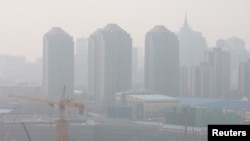China and the United States, the world’s two biggest carbon polluters, have reached a new agreement to take urgent measures to curb climate change.
The two countries said in a joint statement late Saturday that they “are committed to cooperating with each other” and other nations to deal with the climate crisis “with the seriousness and urgency that it demands.”
U.S. special envoy for climate John Kerry and Chinese counterpart Xie Zhenhua reached the agreement during three days of talks last week in Shanghai, just days ahead of the virtual summit on the issue being hosted this week by U.S. President Joe Biden.
Kerry told reporters in Seoul on Sunday that he considers the language of the document to be “strong” and that China and U.S. agreed on "critical elements on where we have to go."
But Kerry, a former U.S. secretary of state and the losing Democratic candidate for president in 2004, added, "I learned in diplomacy that you don't put your back on the words, you put on actions. We all need to see what happens."
China, the world's biggest carbon polluter, and the second worst, the United States, emit nearly half of the fossil fuel fumes that are warming the planet's atmosphere. Their cooperation would be crucial in combating man-made pollution.
The U.S., the world’s biggest economy, and No. 2 China, are trade rivals across the globe and have contentious relations on human rights and China’s territorial claims surrounding Taiwan, which the U.S. supplies with military weapons even as it continues its “one China” policy, recognizing Beijing as the sole Chinese government.
Kerry noted that China is the world's biggest coal user and discussed ways to transition to other forms of energy.
“I have never shied away from expressing our views shared by many, many people that it is imperative to reduce coal, everywhere," he said.
Su Wei, a member of the Chinese negotiation team, told state broadcaster CCTV on Sunday that the two countries reached a consensus for future cooperation on climate issues.
Biden has invited 40 world leaders, including Chinese President Xi Jinping, to the climate summit on Thursday and Friday.
The U.S. and other countries are expected to announce further targets to cut carbon emissions ahead of or at the summit, and pledge financial help for climate control by poorer countries. It appears unlikely that China will set new environmental control targets.
Chinese Vice Foreign Minister Le Yucheng told the Associated Press on Friday, "For a big country with 1.4 billion people, these goals are not easily delivered. Some countries are asking China to achieve the goals earlier. I am afraid this is not very realistic."
But Xi on Friday said China remained committed to climate goals he had announced last year, while adding that the climate issue should not be “a bargaining chip for geopolitics” or “an excuse for trade barriers,” an apparent reference to ongoing disputes with the United States.
“This is undoubtedly a tough battle,” Xi said in a conference call with President Emmanuel Macron of France and Chancellor Angela Merkel of Germany, according to an account of the meeting released by the Chinese foreign ministry.
“China is sure to act on its words, and its actions are sure to produce results,” Xi said. “We hope that the advanced economies will set an example in momentum for emissions reductions, and also lead the way in fulfilling commitments for climate funding.”
It is not clear whether Xi will join Biden’s summit, but Kerry Sunday said, "We very much hope that (Xi) will take part."
Within hours of taking office, Biden rejoined the 2015 Paris climate accord, reversing the withdrawal by his immediate predecessor, Donald Trump.
The U.S.-China statement from the Shanghai meetings said the two countries would enhance "their respective actions and cooperating in multilateral processes, including the United Nations Framework Convention on Climate Change and the Paris Agreement."
It said both countries intend to develop individual pollution control strategies before the planned U.N. climate conference in Glasgow in late 2021 and take "appropriate actions to maximize international investment and finance in support of" the energy transition in developing countries.
Both China and the U.S. have set goals to become carbon-neutral in the coming decades.
Xi said last year that China would be carbon-neutral by 2060 and is aiming to reach a peak in its emissions by 2030.
Biden says the U.S. will switch to an emissions-free power sector by 2035 and have an emissions-free economy by 2050.





